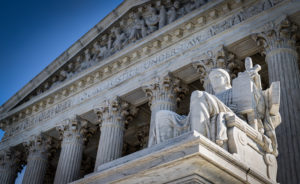
HHS proposes rule to strengthen LGBTQ+ protections under ACA, Education Department proposes accountability measures for for-profit colleges, and more . . .
IN THE NEWS
- The U.S. Department of Health and Human Services (HHS) issued a proposed rule that would implement a section of the Affordable Care Act that prohibits discrimination against LGBTQ+ individuals. The proposed rule would affirm the Act’s enforcement against gender identity and sexual orientation-based discrimination and would expand enforcement to include outpatient care under Medicare Part B. The Trump Administration issued the governing rule interpreting the Act, which limits its scope to exclude LGBTQ+ protections. HHS announced that the proposed rule would align the Act’s protections with the Supreme Court’s 2020 decision in Bostock v. Clayton County, which held that discrimination on the basis of sex includes gender identity and sexual orientation-based discrimination.
- The U.S. Department of Education issued proposed rules to strengthen accountability measures for for-profit colleges. One proposed change would preclude private, for-profit institutions from counting federal aid for veterans and military service members toward the “90/10 rule,” which requires such institutions to obtain at least 10 percent of revenue from non-federal sources. Another proposed change would bolster the requirements that for-profit institutions must meet to convert to nonprofit status. The proposed changes would also clarify eligibility requirements to allow incarcerated individuals to access Pell Grants—a form of federal loan for low-income individuals—for qualifying prison education programs. Secretary of Education Miguel Cardona stated that the proposed changes will prevent for-profit colleges from “evading accountability to students and taxpayers.”
- U.S. Representative Hank Johnson (D-Ga.) introduced a bill that would set 18-year term limits for U.S. Supreme Court justices. The bill would require each President to appoint new justices every two years and would mandate that sitting justices retire in order of seniority. Representative Johnson commented that the bill would restore ideological balance in the Supreme Court in the face of a “legitimacy crisis.” Some commentators have argued that these limits would have minimal impact and that Democrats hoping for increased representation should instead aim to reform the electoral college.
- California Governor Gavin Newsom signed into law a bill that allows California residents to sue any other individual who manufactures, distributes, purchases, sells, or otherwise transports illegal guns into the state. The law, modeled after a restrictive Texas abortion law, allows for a minimum of $10,000 damages per weapon involved. Governor Newsom stated that the state “will use every tool at its disposal to save lives, especially in the face of an increasingly extreme Supreme Court.”
- The U.S. Food and Drug Administration (FDA) announced that it had approved the use of a set of monkeypox vaccine doses manufactured at a plant located in Denmark. U.S. Health and Human Services (HHS) Secretary Xavier Becerra stated that responding to monkeypox was a “critical priority” for HHS and estimated that FDA’s approval would allow distribution of an additional 786,000 vaccine doses in the United States. The Biden Administration has provided approximately 320,000 doses to states since the onset of the monkeypox outbreak. Some advocates have criticized the U.S. government’s response as too slow and argue that the additional doses will be insufficient.
- The House Financial Services Committee has reportedly delayed progress on an anticipated bipartisan stablecoin bill after pushback from Secretary of the Treasury Janet Yellen, who called for stricter consumer protections. The bill would allow banks to issue their own stablecoins–digital currency tied to the value of currencies like the U.S. dollar—and allow for Federal Reserve oversight of stablecoin issuers who are not banks. Critics such as the Independent Community Bankers of America have argued that the bill would not do enough to protect the financial industry from risk.
- The U.S. Environmental Protection Agency (EPA) published a final rule to clarify and improve its greenhouse gas emissions compliance tool for heavy-duty vehicles. The rule updates the procedure for demonstrating compliance with carbon dioxide emissions standards. The rule also corrects factors within the tool’s equation to improve its accuracy.
WHAT WE’RE READING THIS WEEK
- In a recent paper, Jenny Schuetz of the Brookings Institution examined the problem of decreasing housing affordability, which she argued the COVID-19 pandemic has exacerbated. Schuetz contended that state governments should take an active role in housing regulation–a realm that local governments typically dominate–to alleviate local zoning policies’ harm to low-income families, labor markets, and the environment. She recommended that state governments gather data, increase development in areas with high demand, improve safety nets for low-income households, and strengthen conservation efforts. Schuetz acknowledged that state governments would face learning curves and possible political tension, but warned that states must be willing to experiment to relieve families of the effects of COVID-19 on housing.
- In a Center for American Progress report, Jenny Rowland-Shea and Zainab Mirza of American Progress argued that the U.S. Bureau of Land Management (BLM) prioritizes oil and gas development on public lands, jeopardizing the clean energy transition. Because BLM conducts oil and gas leasing on land with even low or no drilling potential, Rowland-Shea and Mirza explained that this shuts out other land uses, including renewable energy. Rowland-Shea and Mirza proposed that to remedy this problem, policymakers should prohibit leasing on low-potential lands, reform the federal oil and gas program, increase renewable energy on public lands, end oil and gas leasing altogether medium-term, and require oil companies to use or give up unused public leaseholds.
- In a Center on Budget and Policy Priorities report, Suzanne Wikle, project director at the Center for Law and Social Policy, and her coauthors noted that administrative burdens, such as strict eligibility rules and extra documentation requirements, disproportionately prevent people of color from accessing Medicaid benefits. Wikle and coauthors argued that state and local governments could reduce these administrative burdens to help resolve one source of systemic racism. Wikle and coauthors explained that although the federal Affordable Care Act reduced many barriers to access, some states have not fully implemented these requirements and have instead kept complicated application processes and manual renewals. The authors proposed that states could make online services more accessible, provide continuous eligibility periods, reduce verification requests, fund outreach and enrollment assistance, and improve communications to increase Medicaid access.
EDITOR’S CHOICE
- In an essay in The Regulatory Review, Katie Eyer, professor at Rutgers Law School, urged supporters of LGBTQ equality to look beyond the ruling in Bostock v. Clayton County to further regulatory reforms, such as the Equality Act. Eyer explained that the Act would codify anti-discrimination protections for LGBTQ individuals in a wide range of contexts, including federally funded programs and public accommodations. The passage of the Act, Eyer urged, would clearly define the scope of protections afforded against LGBTQ discrimination both within and external to Bostock without the need for extensive litigation.



